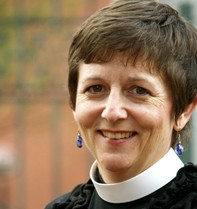In her blog, Theology on the Ground, the Reverend Janine Schenone, priest at All Saints Church in Pasadena, California, takes on the assertion that “liberal mainline churches like the Episcopal Church” are losing membership because they have taken the easy road, theologically. Schenone, who left the Catholic Church for the Episcopal Church, makes the argument against “Christianity Lite”:
I have never found Christianity more demanding of me than in the Episcopal Church. And it’s precisely because the Episcopal Church does not embrace many absolutist statements, but rather requires me and other followers of Jesus to pray, worship, study, and serve to figure out what the heck God requires of us in a given moment.
…In the Episcopal Church, I completed the four-year Education for Ministry course (a seminary-like curriculum of Bible, history, and theology for laypeople). In the Episcopal Church, I have routinely worshipped alongside people who did not all agree with one another, and this has required me to practice deep listening, peacemaking and conflict resolution and has reminded me to remain humble about my own positions on matters…
The governance of my church demands that I discern frequently about who our leaders should be and what we should permit or not permit. As a result, I have had impassioned discussions with fellow Christians about whether anyone should be allowed to take Communion at our Eucharist services, or whether only baptized Christians should be allowed. I’ve debated others about bishop candidates, same-sex marriage, and divestment from fossil fuels. In other denominations, I would have no say in these matters…
We do have existing standards and practices in the Episcopal Church, and we say our faith and practice rest upon the Creeds and the confluence of Scripture, tradition, and reason. Still, those are three mighty rivers to navigate, and they often are turbulent.
Schenone stresses the importance of reverence and love in the Episcopal faith: not only to the sacraments and the liturgy and the scripture, but “toward those who oppose me and to defend the rights of the marginalized.”
What are your thoughts? Have you been in her place, defending the “non-liteness” of the Episcopal Church? What aspects of the Episcopal faith are difficult? Is there a connection between “lite” religion and the decline in Protestant churches?
Posted by Cara Ellen Modisett

